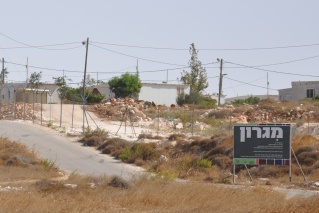 Migron outpost, CC-BY-NC-SA: Helga Tawil Souri
Migron outpost, CC-BY-NC-SA: Helga Tawil SouriAttorney Tamar Feldman, Director of ACRI’s Human Rights in the Occupied Territories Department, sent a letter on Thursday (19.4.12) to Justice (ret.) Edmund Levy, Chair of the Committee to Examine the State of Construction in Judea and Samaria, addressing the fundamental flaw that undermines the committee’s mandate, which is the attempt to distinguish between legal settlements and unauthorized outposts in the Occupied Territories.
Attorney Feldman’s letter argues that the premise of such a dichotomy is inherently flawed:
“Authorized” settlements and “unauthorized” outposts are not distinguishable from each other on grounds of their illegality under International Humanitarian Law or by the severe harm they each inflict upon a range of human rights of the Palestinian residents of the West Bank. In fact, they are also not entirely distinguishable from each other in terms of the support they receive from state authorities. Unauthorized outposts, which began to crop up after Israel’s pledge in the mid-1990s not to establish new settlements, have so far not been given official approval by Israeli governments, but their existence has relied on government aid in matters of security, infrastructure, and even planning.
The Levy Committee, as it is called in the Israeli press, was created in late January in the wake of heated public discourse and high profile court cases concerning unauthorized outposts like Migron. Its letter of appointment, which was signed by Prime Minister Benjamin Netanyahu and Justice Minister Yaacov Neeman, states that, in accordance with policy on the settlements, “generally, illegal building that occurs on private land will be removed, while the planning status of structures located on State lands will be regulated by the appropriate professional ranks.”
ACRI’s letter highlighted the problematic distinction between private land and public land in occupied territory. In the event that a settlement is built on private land, it constitutes a clear violation of international law prohibiting the confiscation of private property. When a settlement is built on public land, it constitutes a violation of the prohibition on the exploitation of resources of the occupied territory for the needs and benefit of the occupying power – a prohibition the High Court has upheld on several occasions. Both types of construction in the territories constitute clear and blatant violations of Article 49 of the Fourth Geneva Convention, which concerns the protection of civilians during war.
According to Attorney Feldman, “Israeli governments – past and present – have forgotten and caused the public to forget the basic legal principle according to which an occupying power is obligated to act as a temporary trustee of the territory it occupies. In order for the committee to meet and comply with international law and prevent further aggravation of the violation of the human rights of Palestinians, it must conclude unequivocally that it is impossible to retroactively sanction Israeli construction established in the territories illegally.”
To read the complete letter, click here (PDF)








Pingback: Israele, braccio di ferro di Netanyahu contro l’abbattimento delle colonie | Lettera22 per il Fatto | Il Fatto Quotidiano